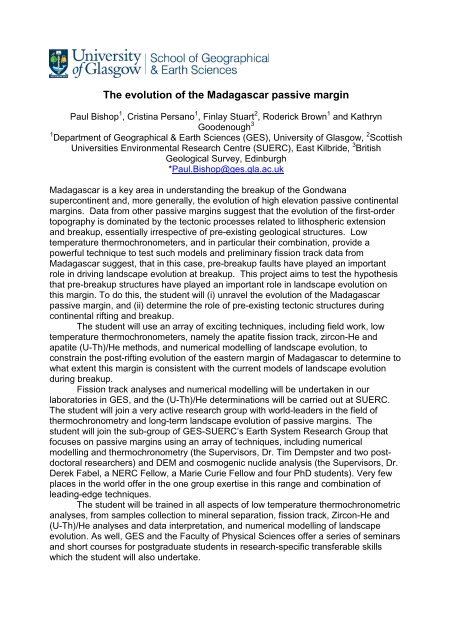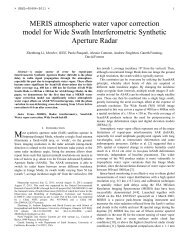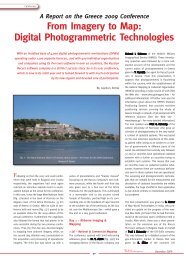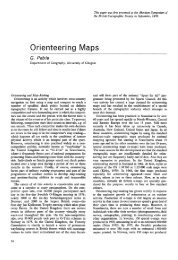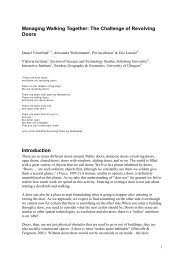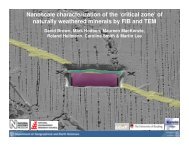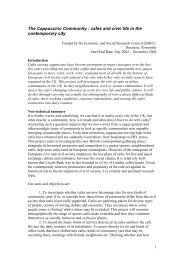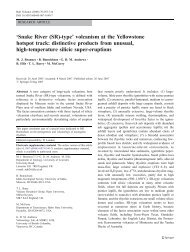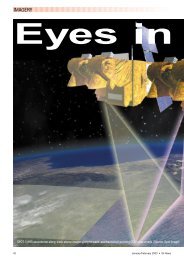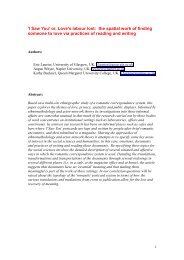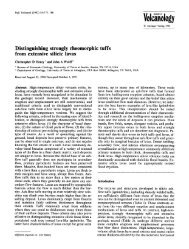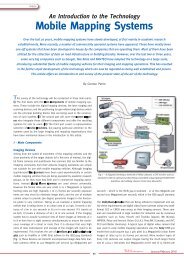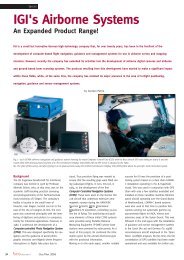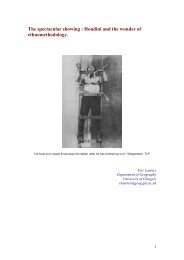the evolution of the madagascar passive margin - University of ...
the evolution of the madagascar passive margin - University of ...
the evolution of the madagascar passive margin - University of ...
Create successful ePaper yourself
Turn your PDF publications into a flip-book with our unique Google optimized e-Paper software.
The <strong>evolution</strong> <strong>of</strong> <strong>the</strong> Madagascar <strong>passive</strong> <strong>margin</strong><br />
Paul Bishop 1 , Cristina Persano 1 , Finlay Stuart 2 , Roderick Brown 1 and Kathryn<br />
Goodenough 3<br />
1 Department <strong>of</strong> Geographical & Earth Sciences (GES), <strong>University</strong> <strong>of</strong> Glasgow, 2 Scottish<br />
Universities Environmental Research Centre (SUERC), East Kilbride, 3 British<br />
Geological Survey, Edinburgh<br />
*Paul.Bishop@ges.gla.ac.uk<br />
Madagascar is a key area in understanding <strong>the</strong> breakup <strong>of</strong> <strong>the</strong> Gondwana<br />
supercontinent and, more generally, <strong>the</strong> <strong>evolution</strong> <strong>of</strong> high elevation <strong>passive</strong> continental<br />
<strong>margin</strong>s. Data from o<strong>the</strong>r <strong>passive</strong> <strong>margin</strong>s suggest that <strong>the</strong> <strong>evolution</strong> <strong>of</strong> <strong>the</strong> first-order<br />
topography is dominated by <strong>the</strong> tectonic processes related to lithospheric extension<br />
and breakup, essentially irrespective <strong>of</strong> pre-existing geological structures. Low<br />
temperature <strong>the</strong>rmochronometers, and in particular <strong>the</strong>ir combination, provide a<br />
powerful technique to test such models and preliminary fission track data from<br />
Madagascar suggest, that in this case, pre-breakup faults have played an important<br />
role in driving landscape <strong>evolution</strong> at breakup. This project aims to test <strong>the</strong> hypo<strong>the</strong>sis<br />
that pre-breakup structures have played an important role in landscape <strong>evolution</strong> on<br />
this <strong>margin</strong>. To do this, <strong>the</strong> student will (i) unravel <strong>the</strong> <strong>evolution</strong> <strong>of</strong> <strong>the</strong> Madagascar<br />
<strong>passive</strong> <strong>margin</strong>, and (ii) determine <strong>the</strong> role <strong>of</strong> pre-existing tectonic structures during<br />
continental rifting and breakup.<br />
The student will use an array <strong>of</strong> exciting techniques, including field work, low<br />
temperature <strong>the</strong>rmochronometers, namely <strong>the</strong> apatite fission track, zircon-He and<br />
apatite (U-Th)/He methods, and numerical modelling <strong>of</strong> landscape <strong>evolution</strong>, to<br />
constrain <strong>the</strong> post-rifting <strong>evolution</strong> <strong>of</strong> <strong>the</strong> eastern <strong>margin</strong> <strong>of</strong> Madagascar to determine to<br />
what extent this <strong>margin</strong> is consistent with <strong>the</strong> current models <strong>of</strong> landscape <strong>evolution</strong><br />
during breakup.<br />
Fission track analyses and numerical modelling will be undertaken in our<br />
laboratories in GES, and <strong>the</strong> (U-Th)/He determinations will be carried out at SUERC.<br />
The student will join a very active research group with world-leaders in <strong>the</strong> field <strong>of</strong><br />
<strong>the</strong>rmochronometry and long-term landscape <strong>evolution</strong> <strong>of</strong> <strong>passive</strong> <strong>margin</strong>s. The<br />
student will join <strong>the</strong> sub-group <strong>of</strong> GES-SUERC’s Earth System Research Group that<br />
focuses on <strong>passive</strong> <strong>margin</strong>s using an array <strong>of</strong> techniques, including numerical<br />
modelling and <strong>the</strong>rmochronometry (<strong>the</strong> Supervisors, Dr. Tim Dempster and two postdoctoral<br />
researchers) and DEM and cosmogenic nuclide analysis (<strong>the</strong> Supervisors, Dr.<br />
Derek Fabel, a NERC Fellow, a Marie Curie Fellow and four PhD students). Very few<br />
places in <strong>the</strong> world <strong>of</strong>fer in <strong>the</strong> one group exertise in this range and combination <strong>of</strong><br />
leading-edge techniques.<br />
The student will be trained in all aspects <strong>of</strong> low temperature <strong>the</strong>rmochronometric<br />
analyses, from samples collection to mineral separation, fission track, Zircon-He and<br />
(U-Th)/He analyses and data interpretation, and numerical modelling <strong>of</strong> landscape<br />
<strong>evolution</strong>. As well, GES and <strong>the</strong> Faculty <strong>of</strong> Physical Sciences <strong>of</strong>fer a series <strong>of</strong> seminars<br />
and short courses for postgraduate students in research-specific transferable skills<br />
which <strong>the</strong> student will also undertake.
Application procedure and deadlines<br />
To be considered for PhD studentships to be held in <strong>the</strong> School <strong>of</strong> Geographical and Earth<br />
Sciences (GES), suitably qualified candidates should apply via <strong>the</strong> website <strong>of</strong> <strong>the</strong> College <strong>of</strong><br />
Science and Engineering<br />
(http://www.gla.ac.uk/colleges/scienceengineering/graduateschool/prospectivestudents/essenti<br />
alinformation/). Closing dates for <strong>University</strong> and research council funded studentships will be in<br />
early in <strong>the</strong> new year, as stated on <strong>the</strong> GES studentships page:<br />
(http://web2.ges.gla.ac.uk/~mlee/GES%202010%20studentships).<br />
Non- English speakers must meet <strong>the</strong> <strong>University</strong>’s English language requirements. Candidates<br />
for NERC studentships should also meet <strong>the</strong> NERC's requirements for both academic<br />
qualifications and residential eligibility. For more information go to<br />
http://www.nerc.ac.uk/funding/application/studentships and please note that non-UK European<br />
Union citizens will be awarded fees only by NERC.<br />
For informal enquiries about <strong>the</strong> research projects please contact <strong>the</strong> relevant supervisors.<br />
Information on <strong>the</strong> GES graduate school and <strong>the</strong> application process can be obtained from Mrs<br />
Jean McPartland, <strong>the</strong> assistant to head <strong>of</strong> <strong>the</strong> School (Jean.McPartland@glasgow.ac.uk ), or<br />
Pr<strong>of</strong>essor Susan Waldron (Susan.Waldron@Glasgow.ac.uk), <strong>the</strong> head <strong>of</strong> <strong>the</strong> GES graduate<br />
school.


